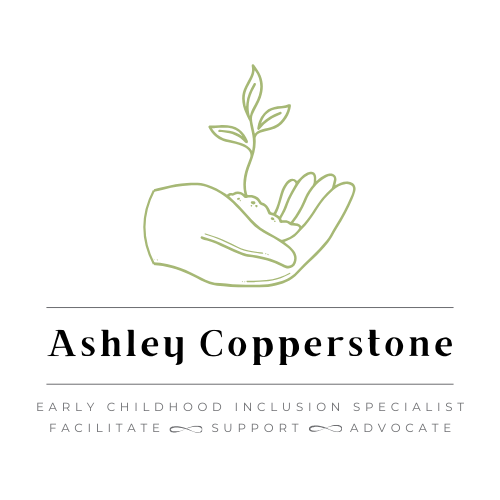Working with Early Childhood Students, Pre-Service, and In-Service Educators In-Person in Michigan and Virtually Across the United States

How would your pre-service educators grow if they had direct access to someone currently teaching in inclusive, early childhood classrooms—where theory meets lived practice every day?
Are your students being equipped with the tools to confidently bridge academic preparation with the realities of today’s diverse, complex, and ever-evolving classrooms?
What could it look like for your program to partner with an in-service educator who not only teaches equity and collaboration, but actively models it in real-time for future teachers?
With over a decade of hands-on experience in early childhood and special education, I offer dynamic collegiate workshops—available as one-time sessions or extended series—designed to support pre-service educators and higher education faculty that are looking to combine their academic and research understanding with in-service evidence. My work centers inclusive, equity-driven, and developmentally responsive practices that reflect the realities of today’s classrooms.
As an adjunct faculty member and seasoned educator, I specialize in bridging the gap between theory and practice. I’ve taught courses such as I bring firsthand classroom experience and a deep passion for collaboration and reflective teaching. At the collegiate level, I’ve had the privilege of teaching courses such as EDI 317: Collaborating with Families and Other Professionals, where we explore meaningful partnership strategies, EDI 312: Child Guidance, where we learn how to support and manage behaviors in the early childhood classroom, and EDF 215: Philosophies of Early Childhood Education, where we explore the development and models of early childhood education. .
I partner with programs to design engaging workshops, co-develop syllabi, and offer targeted professional development that prepares educators to lead with empathy, adaptability, and intention. .
Let’s collaborate to build meaningful learning experiences that empower future educators and elevate your program’s impact.

Workshop Offerings
Special Education & IEPs
Writing Meaningful IEP Goals in Early Childhood Special Education
Teach best practices for creating developmentally appropriate, individualized, and measurable IEP goals.From Data to Decision: Creating Quality IEPs That Center the Child
Walk through the IEP development process with a focus on family input, authentic assessment, and strength-based planning.Understanding and Applying ECERS and CLASS in Inclusive Classrooms
Train educators to use assessment tools thoughtfully to support inclusion, engagement, and continuous classroom improvement.Navigating Self-Contained and Co-Teaching Classrooms in SPED EC
Provide insights into the logistics, benefits, and challenges of various special education service models in early childhood.
Music, Movement, and Daily Routines
Rhythm & Regulation: Using Music as a Tool in SPED Early Childhood Settings
Train educators to integrate music for emotional regulation, transitions, and academic instruction in inclusive classrooms.Soundscapes of Belonging: Music-Driven Learning in Early Childhood Special Education
Explore inclusive music activities that build language, connection, and sensory integration for all learners.Responsive Routines: Building a Secure Classroom Through Structure & Ritual
Highlight how developmentally appropriate routines and rituals can support behavior, safety, and connection for diverse learners.Songs for Self-Regulation: Creating Calm Through Music & Movement
Teach techniques for using music and movement to guide transitions, support self-soothing, and promote joyful learning
Classroom Environment & Curriculum
Designing Inclusive Classroom Environments That Teach
Guide future educators in setting up responsive, culturally attuned, and neurodiversity-friendly spaces that promote autonomy and access.Process Over Product: Designing Inquiry-Driven, Play-Based Curriculum
Emphasize emergent curriculum methods that promote curiosity, social-emotional learning, and developmental alignment.Building Classroom Community in Diverse Early Childhood Settings
Explore trauma-informed approaches and responsive practices that foster belonging, voice, and safety for all children, and promote joyful learning.
Inclusive & Equity-Centered Practice
Bridging the Gap: From Theory to Practice in Inclusive Early Childhood Classrooms
Equip pre-service educators with real-world strategies to implement inclusive, neurodiversity-affirming practices that reflect today’s classrooms.Equity in Early Education: Foundations and Frameworks for Justice-Oriented Practice
Explore how to center equity, representation, and accessibility in both curriculum development and classroom interaction.
Collaboration & Family Engagement
Collaboration in Action: Partnering with Families and Professionals
Deepen understanding of interdisciplinary teamwork, IEP team dynamics, and relationship-building with families from diverse backgrounds.Reflective Practice for Pre-Service Educators
Support the development of reflective habits that lead to responsive, growth-minded, and ethical teaching.
Don’t See What You Are Looking For?
My offerings are not limited to past presentations, let’s connect and talk about how we can work together to meet your needs!
My Teaching Approach
Practice-Driven Pedagogy
I ground instruction in real-world classroom experience, using current, evidence-based practices to bridge theory and practice. This allows pre-service teachers to connect what they’re learning with what’s actually happening in inclusive and diverse early childhood and special education settings today.
Reflective and Equity-Centered Teaching
I encourage pre-service teachers to critically reflect on their identities, biases, and beliefs as they develop their teaching voice. My approach emphasizes the importance of creating justice-oriented classrooms that honor each child’s lived experience, neurodiversity, and cultural background.
Active, Process-Based Learning
I model and facilitate hands-on, inquiry-driven learning rooted in collaboration—with peers, families, and communities. Whether exploring co-teaching models, designing inclusive curriculum, or engaging in activities they can add to their toolbox of classroom practice, I help pre-service teachers build the skills they need to create responsive, child- centered classrooms.





